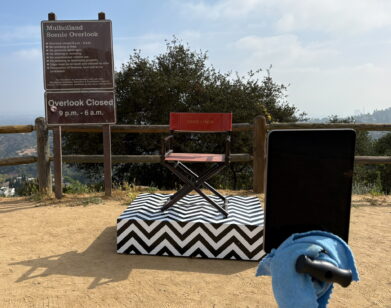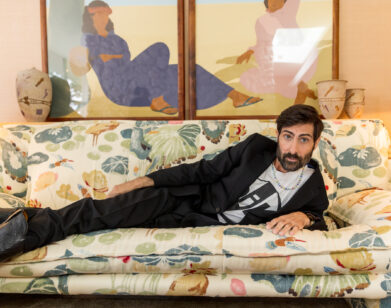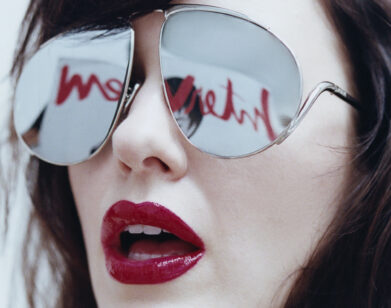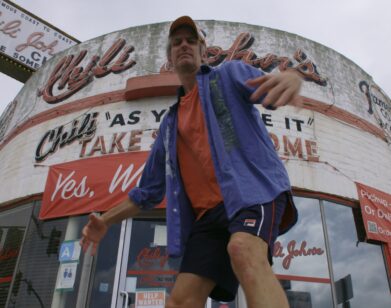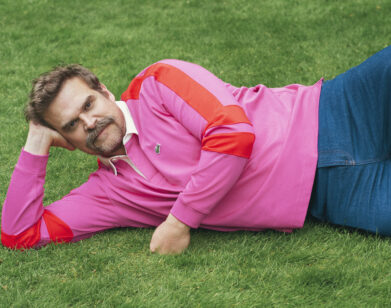Elizabeth Chai: What Comes Around
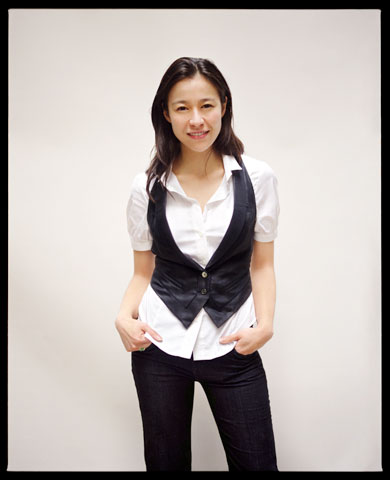
In 2003, at the height of the Iraq War and at a moment of tense international debate about the role of religion in politics, the best-selling and highly influential Senegalese griot singer Youssou N’Dour released an album called Egypt. The record was a personal and spiritual expression of N’Dour’s reverence for Islam—a vast departure from his previous, pop material—and its release, during the holy month of Ramadan, resulted in a firestorm of national controversy: The conservative Senegalese Muslim community decried the notion of combining faith and pop music, and the album instantly became taboo. Ads were pulled from the airwaves with no explanation and street vendors sent back cassette tapes.
Elizabeth “Chai” Vasarhelyi, the filmmaker best known for her 2003 documentary about young Kosovars who came of age during the war, was documenting the singer as he performed the album to live audiences all over the world. The resulting film, Youssou N’Dour: I Bring What I Love, captures the initial outcry upon Egypt‘s release, and the album’s ultimate triumph: Egypt won a Grammy; the Senegalese community revisited, and finally, embraced it. (N’Dour auctioned off the Grammy for cash, which he then used to donate to buying an ambulance.) I Bring What I Love opened in limited theaters this month. We spoke with Vasarhelyi about the malaria country, and patience.
LUCY MADISON: What inspired you to make a film about Youssou N’Dour?
ELIZABETH CHAI VASARHELYI: There are two things. I was frustrated by the images of Africa in the media, and I felt frustrated about my own inability to affect change, given the political situation at the moment. I thought that music was one way to look at Africa in a more positive light. A film came out at the time called Amandala, which looks at the events in South Africa through music, and Youssou’s name comes up a lot. I wasn’t interested in a biopic and I wasn’t interested in a concert film, but when I saw him perform live, there was something almost life-affirming about the experience—and I’m not a religious person. met him and he shared the Egypt album with me, and the moment I heard it I knew that there was a film that should be made.
LM: How did you go about actually facilitating the film? It seems like it would be difficult, even just logistically speaking.
ECV: It was. But I think that Youssou knew it was an important moment. He really believed in the Egypt album and he obviously had major reservations about releasing it. And so he said yes, and his management said yes – everyone said yes many times. But I didn’t have a start date. Everyone was like, “Oh great idea,” and I was like, “Can we start filming now?”
LM: But you couldn’t actually get anyone to give you a date?
ECV: Right. But then I met a guy who was his bodyguard, through a friend of a friend. This guy lives in New York and he said, “You know, if you buy me a ticket to Senegal, I’ll put you in front of Youssou.”
LM: Wow.
ECV: So I bought this guy a plane ticket, we arrived in Dakar, and six hours later, I was on a bus with Youssou’s band – without Youssou. It was about a thirteen-hour drive to the Mauritania-Senegal Border, where there was an anti-malaria concert. It’s the middle of night, it took about twenty hours; it’s the hottest place I’ve ever been and the malaria capital of the world. Finally, in the middle of the night he was about to go onstage, they called me and were like “Chai, come, come see Youssou.” The door opened to his shiny SUV, and he looks at me and just begins laughing, because he had no idea who it was up until that point. And here I am being like, “Hey.”
LM: “You again!”
ECV: The next day I was summoned to go meet his spiritual guide, who blessed the project, and we began shooting three weeks later.
LM: The film essentially addresses politics and religion through the lens of an individual musician. That seems, particularly given the timeframe and the political climate.
ECV: We were telling a very specific story. If any larger themes come out of it, that’s wonderful. But when you are making a film, you stick to what your story is, and to the specificity of that. I never claim to be any expert in Islam, and I think that Youssou would probably say something very similar, in that, his faith is his faith. There’s no authoritative voice in this film; it’s merely one story.
LM: Were you already working on the project when Egypt was released? What was it like to be sort of involved in that first controversy as it unfolded?
ECV: It was shocking, because at the end of the day, this was Youssou’s most personal, and probably his most personally important, album. I think it’s something he had always wanted to do. The day after the album was released in Senegal, there was a debate on the radio and people began calling with objections. No one had actually listened to the music. But overnight, about fifty-thousand cassette tapes were returned by street vendors. The TV stations pulled the advertisements off the air – just said that they didn’t want to show them. It was radio silence; suddenly there was no talk about this album. Youssou was performing abroad, and the album was being very well-received. I think a lot of people around Youssou were much more worried than he was. It’s this thing about him, it’s his charisma. He always truly had faith that his own audience would figure it out.
LM: After he won the Grammy, and was invited to meet with the Senegalese president, did everybody embrace the fact that the tides had turned, or was there any residual resentment? Why do you think that people suddenly embraced the album, first of all?
ECV: To Senegal, winning the Grammy was not so much about Western approval of music. It was like bringing home an Olympic gold medal. It was the first time Senegal had won an honor like that, and it was such a big deal that it forced a recontextualization of the album. The question was, and I think you kind of see it in the film, “What’s the big deal?” And so there was a curiosity of what was being celebrated. It also coincided within days of Mustapha M’Baye, a really respected religious singer, deciding that he would lend his support to Youssou by performing a duet about the Prophet Muhammad, and that was huge. I was always like, “Youssou, aren’t you bitter?” But that’s just not who he is.
LM: What’s next for you?
ECV: What’s next for me? Um, I’ve shot two films at once. I made a film about religious pilgrimage, because it was so impressive when we saw it. I work with some wonderful cinematographers and we just kind of made a decision at the same time to make a more experimental, observational documentary about that pilgrimage. I’m finishing up that, and I’m also working on a fiction project…
LM: Is that your first fiction?
ECV: Yeah, I directed plays, and I would say for me documentaries and fiction films are equal. It’s the same challenge of a story with a beginning, a middle, and an end.


